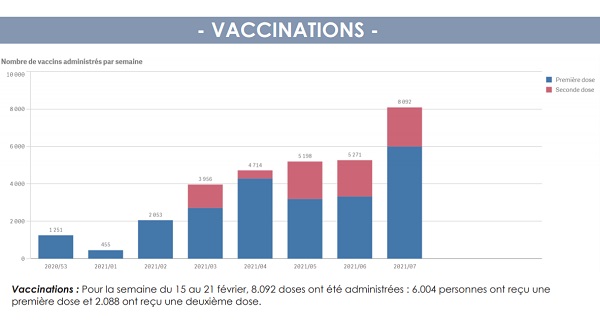 Blue: first dose of vaccine; pink: second dose;
Credit: MSAN
Blue: first dose of vaccine; pink: second dose;
Credit: MSAN
In its latest COVID-19 report, Luxembourg's Ministry of Health confirmed that the number of COVID-19 cases had gone up 13.7% last week compared to the week before.
For the week of 15 to 21 February 2021, the number of residents testing positive for COVID-19 increased from 1,099 to 1,249 people (up 13.7%) over one week. The number of identified contacts fell from 2,860 to 2,766 (down 3.3%). The number of PCR tests carried out over one week also decreased, from 70,617 to 60,717.
As of Sunday 21 February 2021, the number of active infections stood at 2,613 (compared to 2,597 as of 14 February) and the number of people having recovered from the virus increased from 49,770 to 50,931. The number of weekly deaths stood at sixteen (compared to eleven the previous week), with the average age of those who died standing at 80.
The situation in hospitals remained relatively stable, with 59 COVID-19 patients being treated in normal care and fifteen in intensive care, compared to 55 and thirteen respectively the previous week.
The two COVID-19 consultation centres (CCC), located in Luxembourg-Kirchberg and Esch-sur-Alzette, have recorded a total of 8,098 visits to date, including 430 visits last week (compared to 399 the previous week).
For the reference period, the effective reproduction rate (RT eff) increased slightly from 1.00% to 1.05% and the positivity rate on all tests performed rose from 1.56% to 2.06% over one week (weekly average). The positivity rate on tests performed through a doctor's prescription (people with symptoms) increased from 3.52% to 5.70%.
The incidence rate was 200 cases per 100,000 inhabitants (up from 176) over seven days. The incidence rate increased across all age groups except those aged 0-14 (down 24%), a trend which has been attributed to the recent two-week closure of schools. Compared to the previous week, the 60-74 (up 75%) and 30-44 (up 49%) age groups recorded the greatest increase. The 30-44 age group now has the highest incidence rate while the 60-74 age group continued to have the lowest incidence rate. The average age of people diagnosed with COVID-19 increased to 38.1 years.
For the week of 15 to 21 February, 2,511 people were in isolation (up 4% over one week) and 2,747 were in quarantine (down 28%).
The family circle remained the most frequent context of transmission of COVID-19 infections (45.6%), followed by the leisure (5.7%) and work (4.8%) environments. The source of infection was not clearly attributable in 34.9% of cases (up from 31.1%).
Vaccinations
For the week of 15 to 21 February, a total of 8,092 vaccine doses were administered in Luxembourg: 6,004 people received their first dose whilst 2,088 people received their second dose. At present, the Luxembourg authorities plan to have vaccinated a total of 69,887 people by the end of March 2021. Allowances are likely to be adjusted from week to week according to the production capacities of manufacturers and deliveries.
COVID-19 variants
In recent weeks, the National Health Laboratory (Laboratoire National de Santé - LNS) set up a sequencing system offering representative results for the entire population of Luxembourg.
132 representative samples were taken from the week of 8 to 14 February. From this sample, the LNS detected 76 cases of the British variant (B.1.1.7), i.e. 57.6% of the sample, and six cases of the South African variant (B.1.351), i.e. 4.5%. No new cases of the Brazilian variant (P.1 or P.2) were found. The sample size of 132 is equivalent to 12%, which is higher than the optimal rate of 10% recommended by the European Centre for Disease Prevention and Control (ECDC) to have a representative sample.
Wastewater monitoring
The latest CORONASTEP report drawn up by the Luxembourg Institute of Science and Technology (LIST) indicated a high prevalence of the virus in wastewater at the national level. As in the previous week, a slight upward trend was observed at the start of last week but did not continue into the second half of the week.








